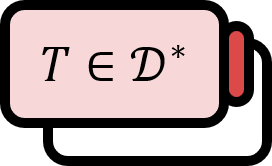Convergence of Distributions to the Dirac Delta Distribution
Theorem1
Let’s assume that $f$ is a function satisfying $\int_{\mathbb{R}^{n}} f(\mathbf{x})d\mathbf{x}=1$. And let $f_{\epsilon}(\mathbf{x})=\dfrac{ 1 }{ \epsilon^{n} }f\left( \dfrac{\mathbf{x}}{\epsilon} \right)$. Then, the corresponding regular antifunction $T_{\epsilon}=T_{f_{\epsilon}}$ of $f$ weakly converges to the Dirac delta antifunction. That is, the following holds.
$$ \lim \limits_{\epsilon \to 0} T_{\epsilon}=\delta $$
Proof
Let $\tilde{f}(\mathbf{x})=f(-\mathbf{x})$. Then, the following holds.
$$ \tilde{f_{\epsilon}}(\mathbf{x})=\frac{1}{\epsilon}f\left( -\frac{\mathbf{x}}{\epsilon} \right) \quad \text{and} \quad \int_{\mathbb{R}^{n}}\tilde{f_{\epsilon}}d\mathbf{x}=1 $$
Furthermore, the test function $\phi$ is a continuous function with a compact support and therefore is bounded. Thus, according to the convolution convergence theorem, the following holds.
$$ \lim \limits_{\epsilon \to 0} \phi * \tilde{f_{\epsilon}} (\mathbf{x})=\phi (\mathbf{x})\quad \forall \mathbf{x} \in \mathbb{R}^{n} $$
Therefore, for any test function $\phi$, the following holds.
$$ \begin{align*} \lim \limits _{\epsilon \to 0} T_{\epsilon}(\phi) &=\lim \limits_{\epsilon \to 0} \int f_{\epsilon}(\mathbf{x})\phi (\mathbf{x})d\mathbf{x} \\ &=\lim \limits_{\epsilon \to 0} \int \tilde{f_{\epsilon}}(\mathbf{0}-\mathbf{x})\phi (\mathbf{x})d\mathbf{x} \\ &= \lim \limits_{\epsilon \to 0} \tilde{f_{\epsilon}}\phi (\mathbf{0}) \\ &=\phi (\mathbf{0}) \\ &=\delta (\phi) \end{align} $$
Thus, it is as follows.
$$ T_{\epsilon} \overset{\text{w}}{\to} \delta $$
■
Gerald B. Folland, Fourier Analysis and Its Applications (1992), p314 ↩︎
